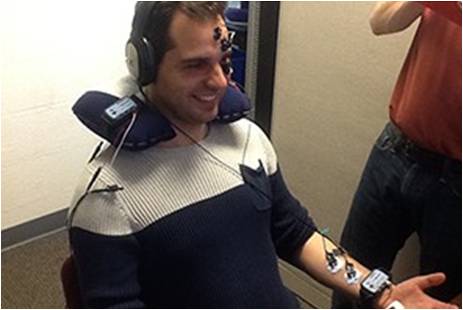The intonation and the accent of sound stimuli help to remember a message better
The intonation and the accent of sound stimuli help to remember a message better
These are the findings of the studies by Emma Rodero, a researcher of the Department of Communication, during her stay at north American universities, thanks to a Marie Curie grant from the European Union.
These are the findings of the studies by Emma Rodero, a researcher of the Department of Communication, during her stay at north American universities, thanks to a Marie Curie grant from the European Union.

Prosody is a branch of linguistics that analyses and formally represents the elements of oral expression such as accent, tone and intonation. Emma Rodero, a researcher of the Prosodic Studies Group (GrEP) and a member of the Department of Communication at UPF, is working on a line of research which aims to study whether prosodic strategies applied to media messages, for example radio, can improve listeners’ attention and memory with the aim of improving cognitive processing.
It is a line of research that can be directly applied in all areas which involve public speaking: communications media, education, advertising, professional lawyers, politicians, etc., and also to help certain groups to better understand messages: the elderly, children with attention deficit, etc.
As Rodero explains, “we analyse whether the differences in intonation, accent and rate of speech, applied to radio bulletins (sonorous-auditory messages), can influence listeners’ cognitive processing and alter the retention and recognition of information”.
A psychophysiological methodology to study the impact of messages
 In her research, Rodero analysed different models of intonation, accent and rate of speech and studied which models improve attention and retention. An innovative methodological approach has been to measure the biological response of the study participants on whom during sound stimulus the researcher measured heart rate, electrodermal activity and the movement of the muscles of the face of each individual.
In her research, Rodero analysed different models of intonation, accent and rate of speech and studied which models improve attention and retention. An innovative methodological approach has been to measure the biological response of the study participants on whom during sound stimulus the researcher measured heart rate, electrodermal activity and the movement of the muscles of the face of each individual.
In summary the results indicate that “with regard to intonation, to increase listeners’ attention and so that messages are better remembered, tonal variations are required in accordance with the content of the message, and as for the accent, it is necessary to stress only about 25% of the words, the most important ones”, explained Rodero. Another area considered is the optimal speech rate, which is around 180 words per minute.
In short, the results show that prosody influences the cognitive and emotional processing of auditory messages and that, therefore, the way in which they are communicated affects attention to and the retention of the content. These results can be applied to any sonorous-auditory message.
A seminar entitled “Stimulating attention and memory with prosody” is to take place on 23 November at 3 p.m. in classroom 52.735-737, on UPF’s Poblenou campus that will explain the research and the results obtained in more detail. The study has been made possible thanks to the European Union Marie Curie grant and professor Rodero’s stay at the universities of Indiana and California.
Reference works:
- Rodero, E. (2015), “Stress variations to stimulate your attention and memory”. Communication at the 55th Annual Meeting of the Society for Psychophysiological Research (SPR), Seattle, USA.
- Rodero, E. & Potter, R. (2015). “Melodic variations to stimulate your attention. Communication across the life span”, Communication at the 65th ICA Annual Conference, Puerto Rico, USA.
- Rodero, E. (2015), “Melodic Variations to Stimulate your Memory. How Pitch Variations can Improve Effectiveness, and Memory of an Audio Message”. Communication at the Fourth Annual Nonverbal Behaviour Preconference. Society for Personality and Social Psychology of America, Long Beach, USA.
